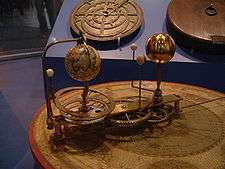Charles Boyle, 4th Earl of Orrery

Charles Boyle, 4th Earl of Orrery KT PC FRS (28 July 1674 – 28 August 1731) was an English nobleman, statesman and patron of the sciences.
The second son of Roger Boyle, 2nd Earl of Orrery, and his wife Lady Mary Sackville (1647–1710), daughter of Richard Sackville, 5th Earl of Dorset, he was born at Little Chelsea, London.[1] He was educated at Christ Church, Oxford, and soon distinguished himself by his learning and abilities. Like the first earl, he was an author, soldier and statesman. He translated Plutarch's life of Lysander, and published an edition of the epistles of Phalaris, which engaged him in the famous controversy with Bentley. He was a member of the Irish Parliament and sat for Charleville between 1695 and 1699. He was three times member for the town of Huntingdon; and on the death of his brother, Lionel, 3rd earl, in 1703, he succeeded to the title.
He entered the army, and in 1709 was raised to the rank of major-general, and sworn one of Her Majesty's Privy Council. He was awarded the Order of the Thistle and appointed queen's envoy to the states of Brabant and Flanders; and having discharged this trust with ability, he was created an English peer, as Baron Boyle of Marston, in Somerset. He inherited the estate in 1714.

Boyle became a Fellow of the Royal Society in 1706. In 1713, under the patronage of Boyle, clockmaker George Graham created the first mechanical solar system model that could demonstrate proportional motion of the planets around the Sun. The device was named the orrery in the Earl's honour.
Charles Boyle received several additional honours in the reign of George I; but having had the misfortune to fall under the suspicion of the government for playing a part in the Jacobite Atterbury Plot, he was committed to the Tower in 1722, where he remained six months, and was then admitted to bail. On a subsequent inquiry it was found impossible to incriminate him, and he was discharged.
Boyle wrote a comedy, As you find it, printed in 1703 and later published together with the plays of the first earl.
In 1728, he was listed as one of the subscribers to the Cyclopaedia of Ephraim Chambers.[2]
Boyle died at his house in Westminster in 1731 and was buried in Westminster Abbey. He bequeathed his personal library and collection of scientific instruments to Christ Church Library; the instruments are now on display in the Museum of the History of Science, Oxford.
His son John, the 5th Earl of Orrery, succeeded to the earldom of Cork on the failure of the elder branch of the Boyle family, as earl of Cork and Orrery.
References
- ↑ "Boyle, Charles, fourth earl of Orrery (1674–1731)". Oxford Dictionary of National Biography (online ed.). Oxford University Press. doi:10.1093/ref:odnb/3124. (Subscription or UK public library membership required.)
- ↑ List of Subscribers to the Cyclopaedia at library.wisc.edu
 This article incorporates text from a publication now in the public domain: Chisholm, Hugh, ed. (1911). "article name needed". Encyclopædia Britannica (11th ed.). Cambridge University Press.
This article incorporates text from a publication now in the public domain: Chisholm, Hugh, ed. (1911). "article name needed". Encyclopædia Britannica (11th ed.). Cambridge University Press.
Bibliography
Smith, Lawrence Berkley. Charles Boyle, 4th Earl of Orrery, 1674-1731 Ph.D. dissertation, University of Edinburgh, 1994.
External links
| Parliament of Ireland | ||
|---|---|---|
| Preceded by Henry Boreman George Crofts |
Member of Parliament for Charleville 1695–1699 With: John Ormsby |
Succeeded by George Evans Robert FitzGerald |
| Parliament of England | ||
| Preceded by Francis Wortley Montagu Edward Carteret |
Member of Parliament for Huntingdon 1701 – 1705 With: Francis Wortley Montagu 1701–1702 Anthony Hammond 1702–1705 |
Succeeded by Sir John Cotton, Bt Edward Wortley-Montagu |
| Honorary titles | ||
| Preceded by The Duke of Ormonde |
Lord Lieutenant of Somerset 1714 – 1715 |
Succeeded by George Dodington |
| Preceded by The Earl Poulett |
Custos Rotulorum of Somerset 1714 – 1715 | |
| Peerage of Ireland | ||
| Preceded by Lionel Boyle |
Earl of Orrery 1703 – 1731 |
Succeeded by John Boyle |
| Peerage of Great Britain | ||
| New creation | Baron Boyle of Marston 1711 – 1731 |
Succeeded by John Boyle |